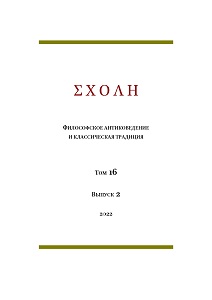Анти-этика сократа: платон versus аристотель
The Anti-Ethics of Socrates: Plato versus Aristotle
Author(s): Irina ProtopopovaSubject(s): Ethics / Practical Philosophy, Ancient Philosphy
Published by: Новосибирский государственный университет
Keywords: Plato; Aristotle; ethics; virtue; good; transcendence;
Summary/Abstract: The purpose of this article is to compare the ethics that can be found in Plato’s Socrates with the ethics of Aristotle in the context of Plato’s and Aristotle’s understanding of the good. The first part analyzes Aristotle’s understanding of ethics. He proceeds from the fact that there is no good in itself, there are many of them. The highest good, according to Aristotle, is the good of polis; his ethics is determined by politics. The highest happiness is to live according to virtue; moral (ethical) virtue (ἀρετὴ ἠθικὴ) can be taught by suggestion and repetition of certain actions; the nature of virtue is connected with the middle, it is necessary to avoid both excess and lack of passions and actions in order to acquire the habit of sticking to the middle. The second part demonstrates the difference between Aristotelian and Platonic concepts of virtue. For Plato, the main thing is the good in itself, which is beyond being (ἐπέκεινα τῆς οὐσίας), but at the same time it is the cause of all things, the cognizable and cognition as such (R. 509b6–10). Accordingly, the good of polis for him is by no means the topmost good; in general, polis and politics are only one of the levels of the so-called visible realm of existence, where opinion rules. Since the good itself goes beyond the limits of existence, a person striving for it must go beyond the limits of existence, and his own self: such transcendence is described in the dialogues “Symposium”, “Phaedrus”, “Phaedo”; in the “Symposium”, it is emphasized that only this transcendence allows to give birth to a genuine virtue, and not merely a ghost of it. Thus, virtue according to Plato can in no way be the middle, and it is also impossible to teach it; it is in this sense that the views of Plato’s Socrates may be called anti-ethics (the word “ethics” in Plato does not exist at all).
Journal: ΣΧΟΛΗ. Философское антиковедение и классическая традиция
- Issue Year: XVII/2023
- Issue No: 1
- Page Range: 351-360
- Page Count: 10
- Language: Russian

